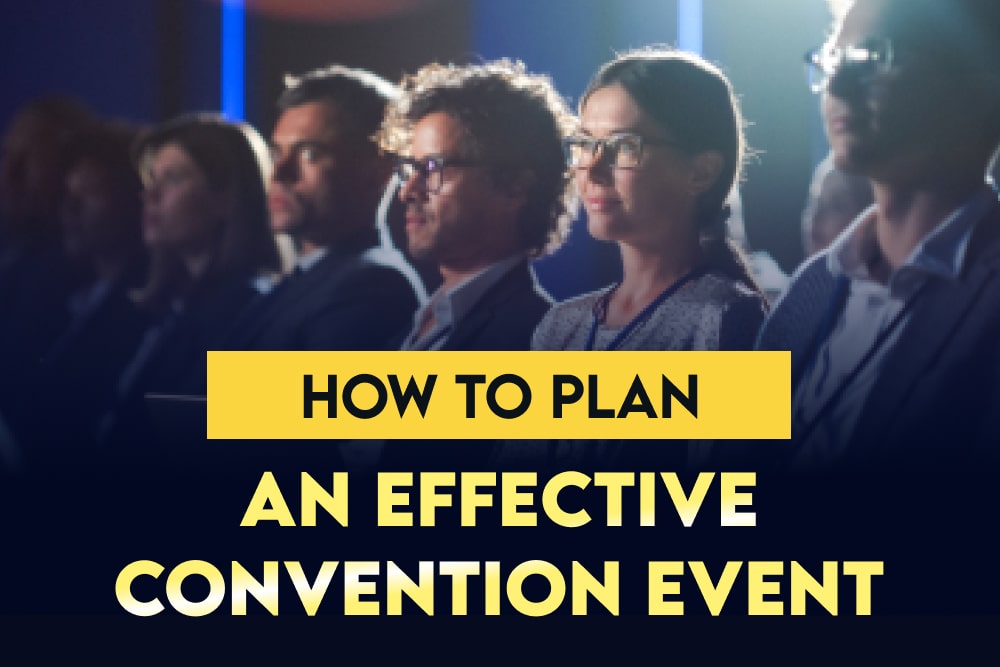

Head of HR at Rent For Event

Head of HR at Rent For Event
Are you eager to host a convention event that leaves a lasting impact? As such, you may be wondering how to plan an effective convention event.
In this guide, we’ll walk you through the step-by-step process of planning a successful convention event. We’ll discuss the significance of conventions. Additionally, we’ll also teach you the top tips to make your event planning as stress-free as possible.

Conventions hold a special place in the world of events and gatherings. These gatherings serve as a powerful medium to bring together like-minded individuals.
These events serve as vibrant platforms for:
They act as melting pots of ideas. It’s where individuals from diverse backgrounds can share their expertise and experiences. As a result, they can enrich the collective knowledge of the community.
The beauty of conventions lies in their versatility. They come in various forms, catering to a wide range of interests and industries.
Here are 10 convention examples to consider:
These events provide companies with a platform to showcase their latest innovations to potential:
Industry-specific seminars make these conventions valuable for learning and building connections.
Fan conventions celebrate various forms of popular culture, such as:
These events offer fans and enthusiasts a chance to meet their favorite artists and creators. Attendees often:
These target individuals working within a specific industry or field. These events feature:
This event provides a valuable platform for networking. Additionally, it helps professionals stay updated with industry developments.
These are gatherings of academic professionals that aid the exchange of:
It provides a platform for scholars to share their work and engage in intellectual discussions.
These bring together people who share common interests, revolving around topics like:
They foster connections and camaraderie among attendees with similar passions.
These conventions cater to aspiring entrepreneurs and established business professionals. With these, you can get valuable insights on:
Attendees have the opportunity to:
Technology and innovation expos showcase the latest advancements in:
These conventions are popular among tech enthusiasts. It also targets businesses seeking tech solutions and researchers looking to collaborate.
Hands-on demonstrations and interactive exhibits make these events engaging and informative.
These events celebrate the richness of different cultures and identities. They also provide a platform to:
Workshops, performances, and art displays are common features of such conventions.
Health and wellness conventions focus on promoting well-being. Attendees can explore:
Workshops, fitness classes, and wellness product exhibits are integral to these conventions.
Educational and EdTech conferences revolve around educational technology and innovative teaching practices. It’s where educators and administrators gather to learn about the latest:
Setting clear and well-defined objectives is the foundation of a successful convention event. Consider what you hope to achieve through this gathering.
Is it to:
Defining these goals upfront will serve as a roadmap for your entire convention planning process.
Having specific goals will help you track your convention’s success. Furthermore, it can aid you in making data-driven decisions.
Knowing your target audience is just as important as setting objectives. Identify your ideal attendees, such as their:
Additionally, consider demographic factors such as:
This information will influence content curation to marketing strategies. Plus, these will enable you to create an experience that resonates with them.
Gain direct insights from your potential attendees through:
Feedback from past conventions can also provide valuable information about attendee preferences and expectations.
The conference venue sets the tone for your convention’s success. Consider factors such as the venue’s:
Choose a venue that aligns with your event’s theme. Make sure that it also caters to the needs of your attendees.
One factor to consider is whether there’s ample space for sessions and workshops. You also have to consider exhibitor booths and networking areas. This way, you can create a comfortable and engaging environment for participants.
Craft a comprehensive budget that covers all aspects of the convention, including:
You need reliable equipment to deliver impactful presentations and ensure smooth communication. Arrange for technical necessities in advance, such as:
Crafting a well-organized and engaging convention program keeps attendees enthralled and satisfied. Identify elements that align with your event’s objectives and target audience, including:
The success of your convention event relies on meticulous preparation in the days leading to the event. First, set up registration and check-in areas efficiently to streamline the entry process for attendees.
Second, ensure that all technical setups are in working order. This also includes checking the audio equipment rental and presentation materials.
Create a welcoming and professional atmosphere with well-designed signage. You should also add decorations that reflect the theme of the convention.
Effective delegation is critical to managing a convention smoothly. Assign specific roles and responsibilities to a capable team of staff and volunteers.
Additionally, communicate expectations and ensure that team members understand their tasks and deadlines. As such, foster effective collaboration among team members.
This way, you allow participants to sign up and access event information with ease.
On the day of the convention, have efficient check-in stations with well-trained staff. This way, you can welcome attendees and provide them with materials.
During the convention, have a dedicated team of staff or volunteers available to provide assistance to attendees. This team can:
A responsive and friendly on-site support team enhances the overall attendee experience.
Well-thought-out backup plans enable you to respond quickly. As such, they ensure minimal disruption to the event.
After the convention, seek feedback from:
You can conduct surveys or hold post-event discussions. These are effective ways to gather valuable insights about their:
Afterward, analyze the feedback to evaluate the overall success of the event. This can also help you identify areas that could be enhanced for future conventions.
Learning from attendee feedback will help you refine your planning strategies. As a result, you can deliver an even more exceptional experience in future gatherings.
Organizing convention events is a rewarding endeavor that requires careful planning. It also needs a deep understanding of your audience’s needs and expectations.
Follow this comprehensive guide to create an enriching experience for all attendees. If you want full-production AV rental, Rent for Event provides the best customer service for a stress-free convention.
Meticulous preparation and effective execution are the keys to the triumph of any convention event. So, go ahead and start planning your convention with confidence.